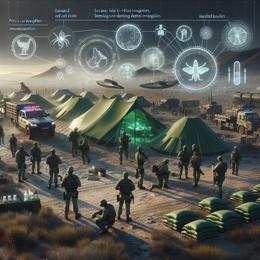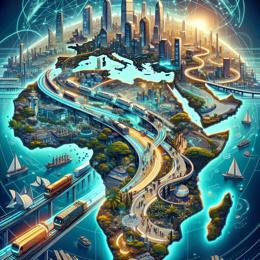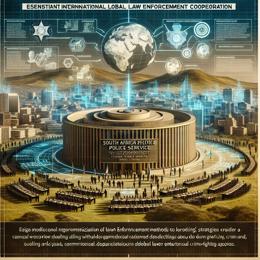Image created by AI
China's Xi Offers Stronger Support to Developing Nations, Challenges US Global Leadership Stance
In a recent development that could have far-reaching consequences for global geopolitics, China's President Xi Jinping has hinted at his country taking on a more assertive role in supporting developing nations across the world. This initiative is seen as an effort to present an alternative to the traditionally US-centric leadership structure in global affairs.
During a state visit by Sierra Leone's President Julius Maada Bio to Beijing, Xi emphasized China's enduring focus on partnership and unity with African countries. Aligning intentions with actions, he stressed on enhancing mutual cooperation within the platforms of international governance, such as the UN Security Council, where China holds a permanent seat, and Sierra Leone currently holds a non-permanent seat. This move by President Xi signals a strategic bid to safeguard not only Africa's interests but those of the developing world at large.
China's diplomatic endeavors under President Xi have increasingly skewed towards the Global South, which encompasses diverse and emerging economies across South America, Africa, and Southeast Asia. By advocating for the Belt and Road Initiative, expanding the BRICS bloc, and positioning China as a mediator in international conflicts such as those in Ukraine and Gaza, Xi has been clear about his vision to reshape global dynamics.
The rhetoric from Chinese leadership, particularly in key speeches like the one marking the Belt and Road Initiative's 10th anniversary, has been provocative, lambasting geopolitical rivalry and bloc politics, clearly in veiled critique of US policies. Though not naming specific countries, these communications express Beijing's discontent with what it perceives as attempts by the US to counter China's rising global influence.
Beijing's ambitious economic diplomacy, typified by vast infrastructure projects in Africa, has been both praised for its contributions to development and criticized for potentially leading recipient nations into a 'debt trap.' Nevertheless, China's Foreign Ministry refutes accusations of ulterior motives, asserting that its relationships in the Global South are principled on peace, global development, and sustaining international order.
This year's upcoming Forum on China-Africa Cooperation (FOCAC) in Beijing is set to be a showcase event. Having evolved from being a primarily trade-centric forum to assuming broader dimensions that include security and ideological discourse, FOCAC reflects China's growing multilateral ambitions.
China's proactive approach, heralded by initiatives like FOCAC that have engaged 53 African nations since its inception, demonstrates Beijing's influential role in such platforms. With two-thirds of the leaders' summits held in Beijing thus far, China's leverage in setting the agenda is undisputable. Consequently, the global community watches closely as China not only fortifies its ties with African partners but also potentially redefines the contours of international politics.
This comprehensive approach by China, offering an alternative to Western-led paradigms, could change the economic and diplomatic landscape for the numerous nations in the Global South. As these countries navigate their paths toward progress and sovereignty on the world stage, China's role and its strategic partnerships could signify a new era in international relations, with Beijing as a central protagonist.










